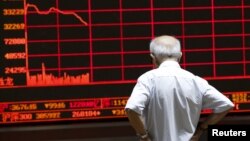Chinese stock indexes again sank lower Tuesday, despite the government’s efforts to boost the exchanges and reassure millions of individual investors by buying state-backed, big cap stocks.
The Shanghai and Shenzhen exchanges are notorious for their volatility, but their huge gains over the past year have attracted many middle-class Chinese investors. The exchanges now have an estimated 90 million Chinese individual market participants.
The composite index of the Shanghai exchange, China's largest, dipped 1.26 percent. Shenzhen’s component index plunged 700 points to close down 5.8 percent.
More companies halt trading
In recent days, China’s government has announced a series of steps aimed at boosting the markets, with brokerages announcing spending nearly $20 billion to buy up shares of the nation’s blue-chip companies. State-backed media have tried to reassure the public that the government has the capability to halt the slide, and have issued stern warnings about spreading rumors.
Before the market opened Tuesday, comments attributed to Premier Li Keqiang about the economy failed to mention the stock chaos, further unnerving investors.
During the trading day, an additional 203 China-listed firms announced a suspension of share trading. Over the past week, more than 650 listed stocks – about a quarter of the total – have halted trading, according to Securities Daily.
The moves are seen as a way for companies to shield themselves from the plummet.
Small-cap China stock index futures fell by its 10 percent limit for a second day in a row.
"Clearly, people want to get their money out of the market and a lot of people need to. You have a ton of margin calls because stocks are halted if they reach their 10 percent limit," said J Capital Research co-founder Anne Stevenson-Yang. "I think at some point they’re just going to suspend trading."
Three weeks, 30 percent fall
China’s government, over the past days, has taken a series of measures to try to stop the market free fall.
"The government has claimed they're going to pull out all the stops and save the market. So if they can't it really undermines their ability to carry through any policy," Stevenson-Yang, speaking from New York, told VOA.
Since the China markets’ peak on June 12, some $3.2 trillion worth of value has been wiped off equities – a 30 percent decline in three weeks.
Analysts for some time have been warning that China was an asset bubble as market fundamentals and slowing growth for the domestic economy did not support the price rises over the past year.
Hong Kong’s Hang Seng index dropped 1 percent.
In Seoul, President Park Geun-hye told members of her cabinet to take pre-emptive measures amid the uncertainties about Greece’s future in the eurozone. She warned of negative effects for South Korea following the rejection by the Greek people, in a referendum, of a proposed international bailout.
South Korea’s benchmark Kospi closed down 0.66 percent.
Japan’s Nikkei index of 225 shares rebounded to close up 1.31 percent, shaking off concerns about both Greece and China.
Most Southeast Asia bourses closed slightly higher.






